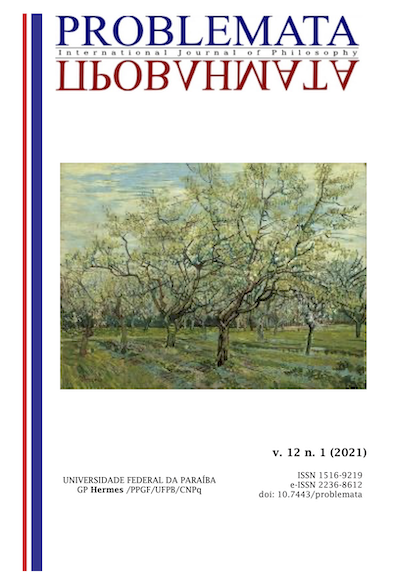THE NOTION OF LOVE AND ITS IMPLICATIONS IN THE AUGUSTINIAN THOUGHT
DOI:
https://doi.org/10.7443/problemata.v12i1.57353Keywords:
Love, Will, Weight, AugustineAbstract
Considering the relevance of love in discussions within the field of philosophy, as well as the importance that Saint Augustine, even today, has within this discipline, the objective is to present in this article the concept and terminology of Augustinian love. To this end, we proceeded with a methodology of a descriptive-explanatory character, in order to present the concept of love in the Augustinian writings and how this is related to the concept of will. To support the study, Augustinian texts such as The Trinity, Confessions, The Christian Doctrine, The City of God and others were used as a theoretical basis; as well as commentators who systematized the doctrine of Augustinian love such as Gilson (2010), Trapé (2018) and Vahl (2018). In this way, it was observed that the notion of love in Saint Augustine is in close relationship with the concept of will, this being the principle of the whole movement of the soul; in turn, love is the impulse and the weight that drives this same will. Thus, love will be straight and orderly if it leads man to desire the intelligible, and false and disorderly insofar as he feels like and clings only to the sensitive, which allows us to conclude that the notion of love in Saint Augustine is key to understanding of man himself, which is what defines man himself.
Downloads
References
AGOSTINHO, S. A doutrina cristã. São Paulo: Paulus, 2002.
AGOSTINHO, S. A verdadeira religião. Tradução de Nair de Assis Oliveira. São Paulo: Paulus, 2002.
AGOSTINHO, S. A Natureza e a Graça. In AGOSTINHO, S. A Graça (I). Tradução de Augustinho Belmonte. São Paulo: Paulus, 1998.
AGOSTINHO, S. A Trindade. Tradução de Augustinho Belmonte. São Paulo: Paulus, 1994.
AGOSTINHO, S. Confissões. Tradução de J. Oliveira e A. Ambrósio de Pina. 6. ed. Petrópolis, RJ: Vozes, 2015.
AGOSTINHO, S. Comentário aos Salmos: Salmos 1 – 50. Tradução das Monjas beneditinas. São Paulo: Paulus, 1997.
AGOSTINHO, S. De beata vita. Tradução de Nair de Assis Oliveira. São Paulo: Paulus, 1998.
AGOSTINHO, S. O livre arbítrio. Tradução de Nair de Assis Oliveira. São Paulo: Paulus, 1995.
AGOSTINHO, S. Solilóquios. Tradução de Adaury Fiorotti. São Paulo: Paulus, 1998.
AGOSTINHO, S. Retratações. Tradução de Augustinho Belmonte. São Paulo: Paulus, 1994.
AMORIM, Tiago. Porque não somos felizes?. Santos, SP: Simorsen, 2016.
GILSON, É. Introdução ao estudo de Santo Agostinho. Tradução de Cristiane Negreiros Abbud Ayoub. 2 ed. São Paulo: Paulus, 2010.
MASCHIO, E. A. Santo Agostinho: O doutor da graça divina contra o mal. São Paulo: Editora Salvat, 2015.
OLIVEIRA, A. N. Nota do tradutor. In AGOSTINHO, S. O livre arbítrio. Tradução de Nair de Assis Oliveira. São Paulo: Paulus, 1995.
OLIVEIRA, A. N. Notas complementares. In AGOSTINHO, S. A Trindade. Tradução de Augustinho Belmonte. São Paulo: Paulus, 1995.
SÃO JOÃO DA CRUZ. Poesias. In SÃO JOÃO DA CRUZ. Obras Completas. Petrópolis, RJ: Editora Vozes, 1984.
TRAPÊ, A. Agostinho: o homem, o pastor, o místico. Tradução de Francisco Evaristo Marcos e Marcos Roberto Nunes Costa. São Paulo: Cultor de Livros, 2018.
VAHL, M. J. Santo Agostinho: Os fundamentos ontológicos do agir. Pelotas: NEPFIL online, 2016.
Downloads
Published
Issue
Section
License
Copyright (c) 2021 Francisco Romário de Queiroz Silva, Francisco Clébio Figueiredo, Francisco Clébio Figueiredo

This work is licensed under a Creative Commons Attribution 4.0 International License.
Authors who publish with this journal agree to the following terms:
- Authors retain copyright and grant the journal right of first publication with the work simultaneously licensed under a Creative Commons Attribution License that allows others to share the work with an acknowledgement of the work's authorship and initial publication in this journal.
- Authors are able to enter into separate, additional contractual arrangements for the non-exclusive distribution of the journal's published version of the work (e.g., post it to an institutional repository or publish it in a book), with an acknowledgement of its initial publication in this journal.
-
- Authors are permitted and encouraged to post their work online (e.g., in institutional repositories or on their website) prior to and during the submission process, as it can lead to productive exchanges, as well as earlier and greater citation of published work (See The Effect of Open Access).





